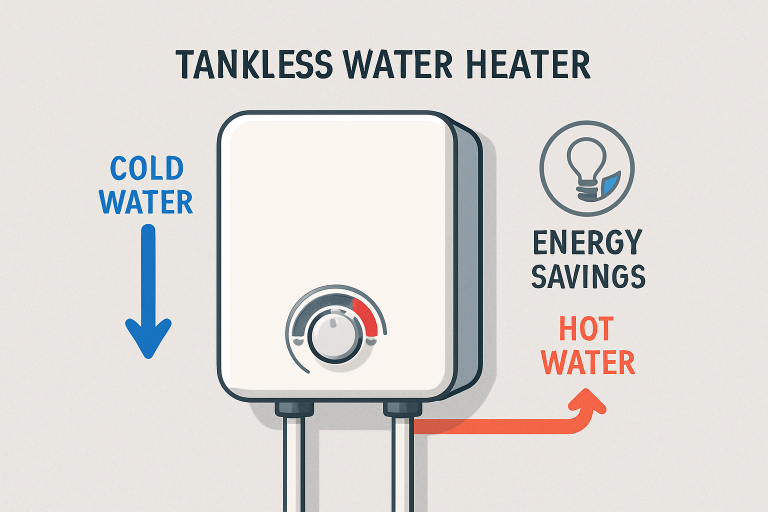Table of Contents
- Introduction
- Energy Efficiency and Cost Savings
- Continuous Hot Water Supply
- Space-Saving Design
- Extended Lifespan and Durability
- Environmental Benefits
- Enhanced Safety Features
- Conclusion
Introduction
Today’s homeowners are searching for ways to maximize efficiency, reduce costs, and increase comfort. One of the smartest home upgrades to consider is replacing an old, inefficient hot water tank with a modern tankless water heater. Making this change can feel daunting, but understanding the benefits will clarify why a tankless system is often the best choice for your next water heater investment. If you’re considering making the move, expert tankless water heater replacement Tucson, AZ can ensure your transition is seamless and stress-free.
Modern tankless water heaters operate on demand. Instead of continuously heating water stored in a large tank, they heat only what you need, exactly when you need it. This fundamental shift in technology brings numerous advantages that impact not only your daily life but also your home’s long-term maintenance, safety, and environmental footprint.
Energy Efficiency and Cost Savings
One of the top reasons homeowners choose to upgrade to a tankless water heater is energy savings. Traditional storage tank water heaters keep a large volume of water hot 24/7, wasting energy through what’s called “standby loss.” In contrast, tankless models only heat water as you use it, significantly reducing wasted energy and resulting in noticeable utility savings each month. According to the U.S. Department of Energy, tankless water heaters are 24% to 34% more energy-efficient for homes that use 41 gallons or less of hot water daily. Even larger households with higher usage can see energy savings of 8% to 14%.
These monthly savings add up, making the slightly higher upfront cost of a tankless water heater more palatable. Over the lifespan of your equipment, the reduction in energy bills often makes up for the difference and more. Additionally, many utility providers offer rebates for energy-efficient upgrades, further improving cost-effectiveness.
Continuous Hot Water Supply
Few things are more frustrating than running out of hot water in the middle of a shower, especially if your home is busy in the mornings or evenings. Traditional water heaters store a finite amount of hot water, and once it’s used up, you have to wait for the tank to refill and reheat. With a tankless system, hot water is produced on demand, ensuring a steady, continuous supply—even during peak usage. This is particularly valuable for large families, homes with multiple bathrooms, or households with hot tubs and spa-like features. You no longer have to schedule showers, laundry, and dishwashing around a recovering energy-hungry tank.

Space-Saving Design
Tankless water heaters are compact and wall-mounted, taking up only a fraction of the space required by bulky storage tanks. This design opens up storage or living space within your utility room or basement. In smaller homes and apartments, or anywhere square footage is at a premium, the shift to a tankless system can make a surprising difference in available space. According to HowStuffWorks, these systems heat water on demand without the need for large storage tanks, offering both energy efficiency and convenience. If you’re remodeling or updating your home, tankless units can be concealed easily out of sight yet remain accessible for routine maintenance.
Extended Lifespan and Durability
Longevity is another standout feature of tankless water heaters. With proper maintenance, these systems can provide reliable service for up to 20 years—nearly double the typical lifespan of traditional tank models, which usually need replacement every 8 to 12 years. Less frequent replacements mean fewer disruptions and long-term savings, reducing both cost and hassle.
Durability is a built-in feature, with many tankless models engineered to resist scale buildup, corrosion, and other common sources of water heater failure. With parts that can be replaced or upgraded, repairs are often simpler and more affordable than with large, integrated tanks.
Environmental Benefits
Switching to a tankless water heater is a positive move for the environment. By heating water only when necessary, these units use significantly less natural gas or electricity than traditional heaters. This reduction directly translates to lower fossil fuel consumption and less carbon dioxide released into the atmosphere. Tankless water heaters are often crafted with recyclable materials and designed to minimize waste during manufacturing and operation. If environmental stewardship is important to you, this upgrade is a tangible way to lower your household’s carbon footprint.
Enhanced Safety Features
Home safety has evolved dramatically, with tankless water heaters at the forefront of technological advancement. Modern systems include a suite of safety mechanisms designed to protect your property and your family. These include intelligent temperature controls to prevent scalding, pressure relief valves to handle unexpected surges, and built-in leak detection to minimize water damage. Some models feature smart sensors and wireless connectivity, notifying homeowners immediately if a problem occurs—offering unparalleled peace of mind.
Additionally, without a tank full of hot water, there’s a greatly reduced risk of catastrophic leaks or ruptures, which are among the leading causes of costly home repairs associated with older tank systems.
Conclusion
Upgrading to a tankless water heater provides a host of valuable benefits: lower energy costs, an endless supply of hot water, space savings, long-lasting durability, environmental stewardship, and advanced safety. Whether you’re motivated by immediate practical concerns or thinking of long-term sustainability, choosing a modern tankless system can meaningfully improve your home and your quality of life. For an expert installation experience that ensures you enjoy all these advantages from day one, trust local professionals familiar with the unique needs of your area.



